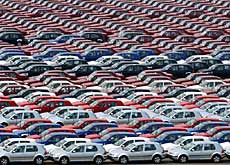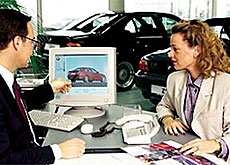Swiss car market gears up for competition

Switzerland’s new car market is to be fully liberalised by January 1, in a move aimed at giving consumers greater choice.
Observers are predicting an increase in the number of new and cheaper cars and parts imported from the European Union.
The Swiss have been able to buy their cars in the EU since 1999. All it takes is a compliance certificate and the payment of four per cent tax and 7.6 per cent VAT.
At present vehicles imported from the EU account for less than three per cent of all new cars bought by the Swiss, but this share could jump in the coming years.
“Parallel imports should increase, although in a limited way, and slowly,” said Urs Wernli, chairman of the Swiss car dealers’ association.
Exclusive deals
It was in 2002 that the Competition Commission (Comco) took the decision to liberalise the car market, in particular scrapping vertical agreements between manufacturers and dealers.
Vertical agreements – when producers make exclusive deals with wholesalers or retailers, imposing a minimum selling price – have been outlawed since April 1 this year under the revised cartel law.
Another result of liberalisation was that independent garages were authorised to repair and enter service contracts on all makes of vehicle, allowing the motorist to choose a mechanic other than the one provided by the dealer.
The competition watchdog gave the industry until the end of this year to comply with the changed regulations, but manufacturers and distributors are already negotiating new contracts.
Choice
The leading motorists’ association, Touring Club of Switzerland (TCS), isn’t convinced that the new rules will make much difference to buying patterns.
“The owner of a vehicle under guarantee will continue to return to the vendor. The owner of a used car no longer under warranty will try another garage,” said Eric Schwizer of the TCS.
Another objective of liberalisation was to free up car dealers to trade in more than one make of car.
But Urs Wernli doesn’t believe that auto supermarkets are a logical consequence.
“I don’t believe it. Nobody in the trade is interested in that, and they are unlikely to be interested for some years to come.”
Schwizer was less adamant. “There is a tendency towards large car dealerships. But the decision to deal in more than one make of car will depend on the regional market, and any change will come slowly.”
He added that profits on new vehicles depended on volume. A dealer who buys lots of a given make gets a bigger discount from the manufacturer.
“A garage dealing in 4x4s of all makes would lose out. The margins would be too restricted.”
Impact
The impact of liberalisation is still hard to predict.
Many have argued that it should increase the number and the type of dealers, stimulate diversity and create new market niches, while asserting a downward pressure on cost.
But Wernli says in the past three years the number of garages has declined by three to five per cent, and that trend will continue.
“The trend was especially marked among small garages, many of which closed their doors. That will continue.”
Wernli said he expected instead to see a greater specialization among garages.
“The large garages will tend to deal with sales and repairs, the small ones with after-sales service,” he predicted.
“A good thing”
For the consumer, liberalisation is rather “a good thing”, says Monique Pichonnaz Oggier, head of the Federal Consumer Affairs Office.
“It should lead to a drop in the price of spare parts, which are particularly expensive, and in the price of cars.”
Olivier Riesen of Comco said new car prices would fall, “insofar as consumers and certain dealers can obtain what they want abroad at a lower price”.
He said he hoped liberalisation would exert a downward pressure on prices in the country. “But it is not impossible that the new regulations will result in a homogenisation of prices.”
But Eric Schwizer of the TCS says he does not expect a significant drop in the price of new cars in Switzerland.
“Car prices in Switzerland aren’t much higher than in neighbouring countries,” he said, adding that while some models are up to 25 per cent more expensive, others are five per cent cheaper.
swissinfo, Pierre-François Besson
271,541 new cars were sold in Switzerland last year.
Purchasers paid an average of SFr35,000 for their new vehicle.
Switzerland’s 5,400 garages employ about 39,000 workers.
The Swiss automobile market is worth SFr74.6 billion ($59.4 billion).
This makes it the most important market in the country.
In November 2002 the Competition Commission began to liberalise the sale of new vehicles, after-sales service and sale of spare parts.
By January 1 2005, manufacturers and distributors must negotiate contracts respecting the new directives governing cartels.

In compliance with the JTI standards
More: SWI swissinfo.ch certified by the Journalism Trust Initiative

You can find an overview of ongoing debates with our journalists here. Please join us!
If you want to start a conversation about a topic raised in this article or want to report factual errors, email us at english@swissinfo.ch.